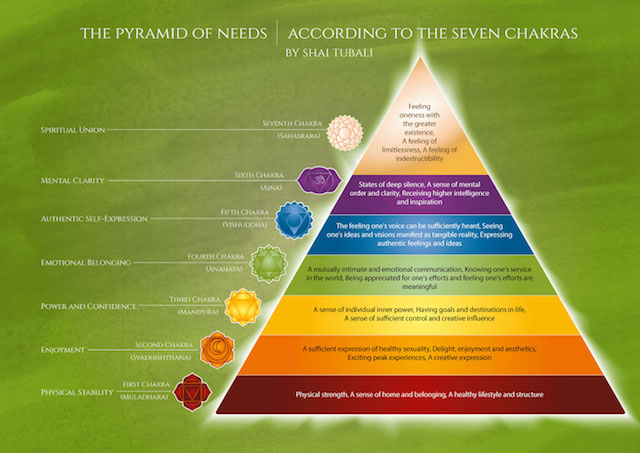
When you think of chakras, what is the first thing that comes to your mind?
Lately, I declared on my Facebook page that I have completed a new book dedicated wholly to the second chakra. One of my friends responded with great bewilderment:
“Really? A whole book for one little chakra?”
This made it clear to me that my conception of chakras has greatly disengaged from the common understanding of this miraculous phenomenon.
The chakras have been popularized as seven (or more, some say) energy centers within the human body. These energy centers, we learn, can be either “blocked,” due to emotional or physiological reasons, or “open.” To attain a proper energy flow, for health, liveliness, and spiritual awakening, one should strive to keep the chakras open.
This, of course, is not wrong. But compared to the vast potential meaning that is held dormant within the chakras, it is an extremely limited perception. Chakras are far more significant to human life than a set of healing colors, symbols, and sounds.
Our understanding dramatically changes as soon as we see these seven energy centers as representations or expressions of the seven layers of life and existence:
1. Life as a biological and physical experience.
2. Life as a sensual space of feeling and enjoyment.
3. Life as an arena of achieving and winning.
4. Life as an emotional space of intimacy and bonding.
5. Life as an interactive space of voicing and influencing.
6. Life as a space of intellectual exploration and learning.
7. Life as a meditative space of self-knowing and pure subjectivity.
We, as human beings, are equipped with these seven centers of perception to be able to communicate with the seven dimensions of life. It’s as if there are seven universal energy centers and seven individual ones for us to interact and align with them.
Accordingly, when we activate all seven, we experience life in its totality—from its most material expression to its ultimate spiritual core. We manage to become fully realized beings, with all the keys of creation in our hands to open the seven doors of our own self: the instinctual self, as well as the sensual, willful, emotional, expressing, thinking, and meditative selves.
From this angle, the real world of the chakras finally opens up and unfolds before us as seven “eyes” through which we can perceive the full-spectrum vision of life. Chakras, we realize, are the number one tool given to us by the cosmos for the complete understanding of, and coping with, life’s different aspects. Using them in this way—making sure we nourish all of these seven layers of the self—we can embrace the complexity of our own self without missing even one dimension or potential experience.
This is also the answer to my Facebook friend: Within each “little” chakra a whole dimension of life can be found. So one can travel into the universe of the chakras endlessly and never find its edge. Each chakra holds a different realm of experience, meaning, purpose, and perception—a different facet of human life.
A fascinating layer of the chakras’ wisdom of life is the complete understanding of human needs.
In 1943, Abraham Maslow, a founder of Positive Psychology, created his well-known model describing our “hierarchy of needs.” Maslow beautifully showed what motivates human beings in their search for meaning in the world. People, he wrote, seek to fulfill physiological needs, as well as needs for safety and belonging. On the more refined levels, they seek esteem abd self-actualization.
What I like about Maslow’s pyramid is that it demonstrates how we are complex beings that have different centers of experience and perception. All need to be fully answered for one to be truly happy. Indeed, it seems like Maslow intuitively captured the world of chakras through his model.
Maslow’s intuition greatly echoes with my broader understanding of the chakras and compelled me to create a pyramid of needs based on chakra knowledge. After all, all of our needs—physical, instinctual, emotional, mental, and spiritual—stem directly from these seven different layers of our being. Such a pyramid powerfully and simply shows us what it means to be a complete human being who simultaneously functions as a sublime spiritual being and an actively engaged human.
If we are feeling unhappy and incomplete in life, it is because some of our needs are being ignored. All we need to do is to take a deep look at this pyramid and ask ourselves which of these needs has been neglected. Ensuring that we take care of all these needs can easily become a highly effective spiritual practice. In fulfilling these needs, one directly balances each of the chakras and thus attains a healthy sense of inner completeness.
1. First Chakra Needs: Physical Stability.
It is a genuine human need to feel a solid ground under one’s feet. We can try to overlook this one, thinking we’re beyond this stage, but this is not a passing stage; it’s our essential sense of inner and outer security: the capacity to rely on solid structures in our lives.
The first component of physical stability is being able to rely on our body. We can walk on life’s path with a fragile and disturbed body, even be spiritually engaged, but this will be so much harder. We need the body on our side: healthy, well-nourished, flexible, and resilient.
The second component is the feeling we have a home to return to and at least one framework to which we belong. This includes a roof over our head, but more broadly, some “group” affiliation and identification. The third component is the ability to rely on our life’s structure and lifestyle: feeling that, in general, we are held by a healthy routine with a reliable income and proper time-management, which ensures we take care of all our needs.
2. Second Chakra Needs: Enjoyment.
The second chakra introduces the authentic need for nourishment in the form of full participation in life’s delight. Life should be an enjoyable experience, and there is nothing holy in discarding this layer of ourselves. Our body is not just a functional machine, and it needs to feel truly alive and happy.
A healthy sexuality is important, though it can easily take the form of physical intimacy and physical warmth. “Healthy” means a happy and loving sharing of the body, rather than being desirous or obsessive. One should make sure that every day is dotted by touches of beauty and pleasure, like encounters with the arts or nature.
As human beings, we are not meant to just endure endless, uninterrupted routine, so a peak experience—intense, thrilling, and adventurous—should “disrupt” our first-chakra’s schedule every now and then. Lastly, life without the joy of creativity—creating something or innovating with passion and excitement—easily depletes our second chakra.
3. Third Chakra Needs: Power and Confidence.
Many are embarrassed to acknowledge they actually need to feel powerful, but this embarrassment leads to nothing but painful suppression. The third chakra tells us we need to feel strong and confident so that we can withstand all pressures, challenges, and power-tensions in social connections and personal relationships.
Another empowering component is knowing we have goals and destinations, as it is essential to feel we are heading somewhere with all our gathered energies. Though we are surely not meant to control everything in our life, we do need to feel “on top” of our life, and able to master and direct it through will and determination. Being unable to influence the events in our life is a state of third chakra deprivation.
4. Fourth Chakra Needs: Emotional Belonging.
Our hearts need to engage in a mutually intimate communication with others, so our emotional longings for loving feedback are not just illusory forms of dependency. The experience of intimate exchange—not only romantic—is a deep and essential type of nourishment.
Beyond the feeling of having a destination in the third chakra, a human heart needs to feel it has a role and meaning in its contribution to the world. This is what psychologist Viktor Frankl recognized in his meaning-seeking psychology of “Logotherapy”: to be psychologically fulfilled, one needs to know one’s existential meaning.
Added to that, one needs to feel that one’s efforts are met with appreciation, so there must be some supportive and affirming environment to recognize that. We all try as hard as we can, even when we go astray from time to time, and we need others and ourselves to recognize that our attempts are meaningful after all.
5. Fifth Chakra Needs: Authentic Self-Expression.
It is healthy to wish for our “voice” to be heard and acknowledged. Speaking our authentic feelings and ideas is a part of engaging in a human society, and when we suffocate our expression, we suppress a vital flow of participation.
We need to give voice to all that we strongly believe in. This doesn’t mean, of course, that everyone should agree and applaud, but that there will always be some who will hear us. It is also essential not to be content with mere expression of feelings and ideas, but also to materialize visions and dreams and make them visible for all to see.
It is unhealthy to stay stuck in one’s inner world, and as a part of this coming out, we need to strive to give an undeniable form to inner visions, from arts to initiatives to building new structures within our lives and the lives of others.
6. Sixth Chakra Needs: Mental Clarity.
Without deep silence, our minds can easily reach dangerously unhealthy states of overactive and neurotic thinking. Meditation is not really a recommendation—it is a need of the human mind screaming to us from the depths of our sixth chakra.
We also need to attain mental order and clarity since when our mind is foggy and chaotic, nothing in our body-mind system works right. It is therefore vital to use any method, from herbal supplementation to cognitive self-understanding, to sustain quietude and the feeling that everything is in place. For this, an essential form of mental nourishment is needed: being supported by great minds, through books and teachings, who help us get in touch with our own peak of intelligence and mental confidence.
7. Seventh Chakra Needs: Spiritual Union.
Last, but surely not least, is our highest spiritual need. As human beings who embody both divinity and humanity, we will forever remain hungry at the soul level as long we do not fulfill oneness with the greater whole of existence.
It is the most refined human need to feel belonging, this time not to a social structure like in the first chakra, but to the universe and even to God. An inherent part of the human condition is the experience of limitation: finding oneself entrapped within a small box of belief-system, conditioning, and thought patterns. Without feeling, at least from time to time, that one can break free from this box and be limitless, a sense of inner suffocation can easily creep in and keep us in misery.
The last need answered by our seventh chakra is to feel connected to a part in us that is unshakable and indestructible. Only our eternal spirit can grant us: The experience that despite all physical fragility and dependency, we are, after all, a divinity expressing itself through a human form.
~
~
~
Author: Shai Tubali
Image: Author’s Own
Editor: Travis May






Read 13 comments and reply